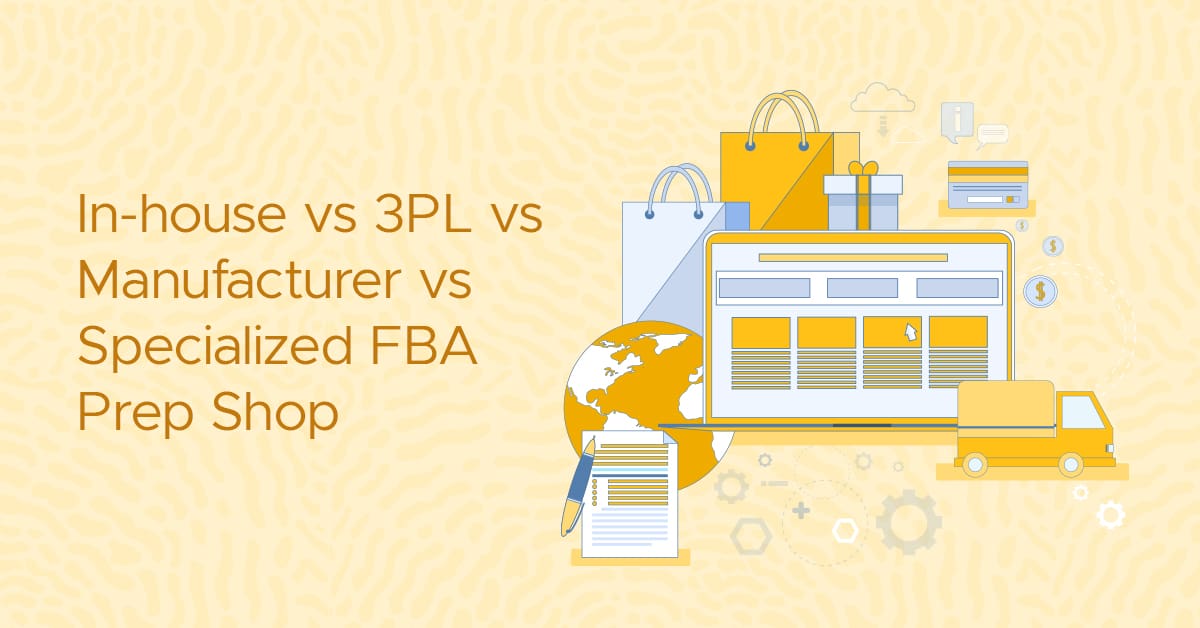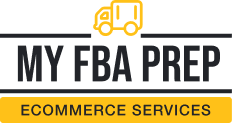
Specialized Amazon FBA Prep Services vs. In-House vs. 3PL vs. Manufacturer

The Amazon marketplace is a gold mine for brands seeking to amplify their reach and boost sales — and 86% of sellers use the platform’s Fulfillment by Amazon (FBA) program to tap into this massive market. However, mastering the intricacies of listing and fulfilling products can be a hurdle, especially given Amazon’s strict FBA requirements.
Fortunately, brands don’t have to contend with this obstacle alone; they have several options for preparing their products, from in-house handling to third-party logistics (3PL) providers, and manufacturer involvement to specialized Amazon FBA prep services. Each approach presents unique benefits and drawbacks, giving brands the power to choose what suits them best.
Keep reading as we analyze their pros and cons and explain how partnering with a specialized Amazon FBA prep services shop can minimize risks and ensure seamless compliance with Amazon’s ever-changing regulations.
In-house Amazon FBA prep services
Handling Amazon FBA prep services internally is appealing, as it offers greater control and can potentially reduce costs. However, this approach requires careful consideration of several factors.
On the positive end, businesses enjoy perks like:
- Total control: One of the primary benefits of in-house Amazon FBA prep services is the level of control it affords. Brands can directly supervise the entire process to ensure every step meets their quality standards. This can be particularly advantageous for products requiring special handling or specific packaging requirements.
- Cost savings: By managing Amazon FBA prep services internally, brands can avoid the service fees associated with third-party providers, which can be attractive for smaller brands or those with tight margins. Additionally, in-house teams can be more flexible and responsive to changes in demand, allowing for quicker adjustments to the prep process as needed.
However, this option comes with a few noteworthy drawbacks:
- High cost of initial setup: Because brands must invest in necessary equipment like packing materials, labeling machines, and quality control systems, the initial setup expenses for in-house Amazon FBA prep services can be substantial.
- Requires ample space: The prep operations require adequate space allocation, which can be a logistical challenge, particularly for brands operating out of smaller facilities.
- Time-consuming: Managing FBA prep in-house can be incredibly time-consuming and diverts attention away from core business activities such as product development and marketing. This, in turn, can hinder growth and reduce overall efficiency.
- High risk of error: One of the most significant risks of in-house Amazon FBA prep services is the potential for errors due to a lack of expertise in Amazon’s complex and frequently changing regulations. Even small mistakes in labeling, packaging, or documentation can lead to costly penalties, delays, and even account suspension.
Ensuring compliance requires ongoing training and staying up to date on Amazon’s latest requirements, which can be burdensome for an internal team.
Requesting a 3PL adds FBA prep services
Often we’ll see sellers talk to their 3PL and ask them to add FBA prep services to the products they’re already handling. This approach can streamline operations by consolidating services under one provider, which opens up benefits like:
- Convenience: Brands can leverage their existing relationship with a 3PL to potentially bundle services and achieve cost savings. This can simplify logistics management, as the 3PL handles everything from warehousing to shipping, including the additional step of preparing products for Amazon FBA.
- Bundled services: Cost savings through bundled services can be significant. By adding Amazon FBA prep services to the services a 3PL already provides, brands may negotiate better rates compared to sourcing them separately. This can be highly enticing for larger brands with substantial logistics needs.
However, there’s a lot of risk involved in getting a generic 3PL to do specialized FBA prep work. In fact, a recent MyFBAPrep customer found us after they tried having their 3PL do the work, then getting fined and having to re-do shipments due to mistakes. Some of the biggest risks with using a generic 3PL for your FBA prep include:
- Lack of specialized knowledge: Generalized 3PLs may lack the specific know-how required to navigate Amazon’s specific and stringent FBA requirements. That, in turn, heightens the risk of errors in the prep process and could lead to non-compliance issues.
- Significant learning curve: Brands might also become the “test subjects” for 3PLs learning to handle Amazon FBA prep services. Overcoming that curve can result in mistakes that are costly and time-consuming to rectify. Issues such as incorrect labeling, inadequate packaging, or missed deadlines can lead to delays, penalties, and even the loss of Amazon selling privileges.
- Possible lack of accountability: Relying on a 3PL that isn’t deeply familiar with Amazon’s guidelines can also give rise to accountability problems. When mistakes occur, resolving these issues might take longer and involve more back-and-forth communication, further exacerbating the impact on the brand’s operations.
Relying on your manufacturer for Amazon FBA prep services
Another option for brands is to give the Amazon FBA prep services responsibility to their manufacturer. This approach can streamline the supply chain by having products arrive FBA-ready, reducing the need for additional handling. Businesses also take advantage of:
- Intimate product knowledge: Manufacturers are already familiar with the specific requirements and characteristics of the items they produce, which helps ensure the prep process is tailored to the item’s needs.
- Streamlined supply chain: By having the manufacturer handle Amazon FBA prep services, products can arrive at the fulfillment centers ready to be shipped to customers. This can reduce handling time and minimize the risk of damage or errors during transit.
- Just-in-time ordering: Another advantage is just-in-time ordering. Brands can place orders as needed, reducing inventory costs and avoiding the need to store large quantities of prepped products. This can improve cash flow and reduce storage expenses.
Want to learn more about specialized inventory replenishment strategies? Check out our guide to retail replenishment best practices so you can avoid going out of stock.
Reliance on a manufacturer for Amazon FBA prep services isn’t fool-proof though:
- Lack of specialized knowledge: While they might be experts in producing the product, manufacturers may be unfamiliar with the FBA program’s requirements, which is likely to cause non-compliance issues.
- Increased risk of non-compliance: Amazon’s guidelines are complex and update frequently. Manufacturers may be unable to stay on top of these changes, producing mistakes that could result in penalties and delays.
- Less flexibility and control: Another drawback is dependence on the manufacturer’s willingness and ability to adapt. Not all are willing or able to take on the additional responsibilities of FBA prep, which can limit a brand’s flexibility and control over the process.
Partnering with a specialized Amazon FBA prep services provider
Contracting with a specialized Amazon FBA prep services provider is often the best solution for brands looking to minimize risks and ensure compliance with Amazon’s requirements. These services are experts in Amazon’s guidelines and offer tailored services to meet these specific needs.
Their strengths include:
- Amazon expertise: Amazon FBA prep services providers are dedicated to staying updated on the latest requirements and ensuring all aspects of the prep process comply with Amazon’s standards. This reduces the risk of errors and non-compliance issues.
- Focus on quality and efficiency: These providers understand the importance of meeting Amazon’s standards and work to ensure that every product is prepped to the highest quality. This can improve customer satisfaction and reduce the likelihood of returns or complaints.
Despite these advantages, there are a few drawbacks to consider:
- Higher service fees: Specialized Amazon FBA prep services companies may charge higher service fees than in-house or general 3PL options. These costs can add up, particularly for smaller brands or those with tight margins.
- Requires strong partnership: Because they depend on an external provider, brands must trust that the Amazon FBA prep services will handle their products correctly and efficiently. This necessitates a strong partnership and clear communication to meet expectations.
When things go wrong
To illustrate the importance of choosing the right Amazon FBA prep services option, consider the following case studies.
Case 1: The costly 3PL choice
A potential MyFBAPrep client initially opted for a 3PL provider that didn’t know Amazon’s FBA requirements intimately. Predictably, this resulted in a series of prep errors that caused expensive delays, incurred penalties from Amazon, and, ultimately, lost sales.
Recognizing the value of expert guidance, the client then turned to MyFBAPrep to avoid such pitfalls in the future.
Case 2: The misinformed manufacturer
Another MyFBAPrep prospect entrusted their manufacturer with Amazon FBA prep services duties. While the manufacturer possessed a deep understanding of their product, they, too, lacked the necessary knowledge of Amazon’s intricate FBA guidelines.
Consequently, non-compliance issues arose, leading to penalties and delays in product listings. The client eventually partnered with MyFBAPrep to ensure adherence to Amazon’s regulations and prevent further complications.
These real-world examples illuminate the potential dangers of contracting with non-specialized providers for Amazon FBA prep services. Errors in the process can be expensive and time-consuming to rectify, so it’s important to partner with an expert team that’s well-versed in Amazon’s evolving FBA requirements.
Wrapping up — Partnering with a specialized Amazon FBA prep services
Each option for FBA preparation — in-house, with a 3PL, through the manufacturer, or via a specialized Amazon FBA prep services shop — has its own pros and cons. While in-house prep offers control and potential cost savings, it comes with high setup costs and a significant risk of errors. Using a 3PL can be convenient but often lacks the specialized knowledge needed to navigate Amazon’s complex requirements. Meanwhile, relying on the manufacturer streamlines the supply chain but carries risks of non-compliance.
Partnering with a specialized Amazon FBA prep services provider like MyFBAPrep is the most reliable solution. Our expertise in Amazon’s guidelines and regulations guarantees quality, efficiency, and minimizes costly errors. If you want to break into this digital marketplace or improve your existing operations, consider MyFBAPrep. Reach out to us for a consultation and learn how we can help streamline your FBA prep process.


